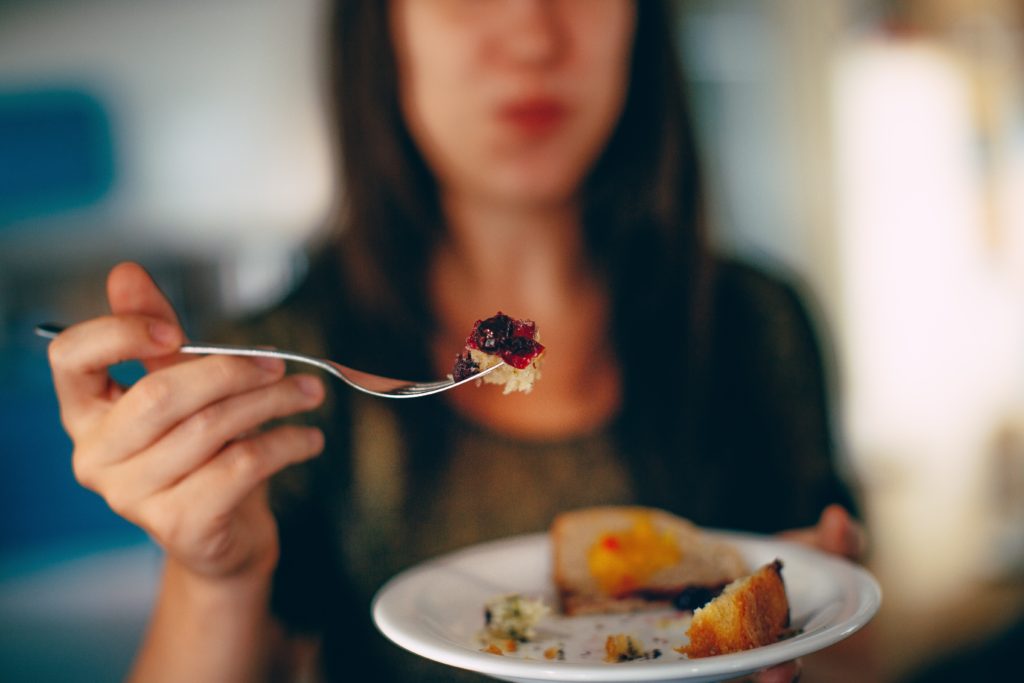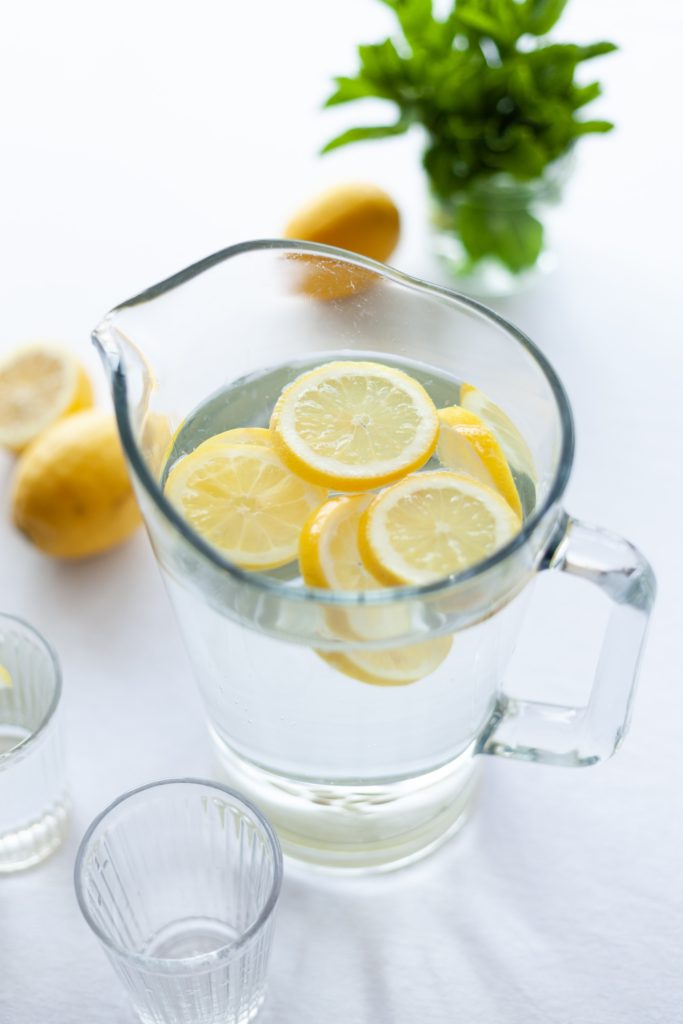Bloating-that oh so uncomfortable feeling

How can we figure out what’s causing it? Perhaps you already have some wise de-bloating habits like avoiding foods you know give you gas. But that’s not completely solving the problem.
I have five more things you can try to help get to the bottom of your bloating, naturally. And I have a stomach soothing recipe for you too.
7 Natural Ways to Deal with Bloating
Do you ever feel a bit “overextended” in the belly after a meal? Perhaps “gassy?” Have you ever carried a “food baby?”
Well, bloating is common. Up to 25-30% of people experience it regularly. It happens when you have trouble digesting. The symptoms come from excess gas, reactions to foods, or food not moving through you as well as it could.
There are many reasons you might experience these symptoms. Maybe because of a serious condition (disease), or a food allergy or intolerance (what you eat). It can also result from how you eat.
In the Metabolic Balance nutrition method, the in-depth analysis of 36 unique blood values and health history indicates exactly what foods you should eat to improve digestion and eliminate gas and bloating.
If you have a serious digestive issue like IBS (Irritable Bowel Syndrome), then make sure you eat accordingly. Same goes if you know certain foods give you gas. Simply avoid them.
If you’re already doing those things, and still experience bloating, here are some great tips for dealing with it naturally.
1 – Don’t overeat
If you overeat at a meal, then you’ll feel bigger around the mid-section. You’ll feel more pressure in your abdomen. Plus, you’re giving your digestive system a hard time. It’s better to eat until you feel almost full and not overindulge. Grab an extra snack or small meal throughout the day if you have to. Just don’t over-stuff yourself in one sitting.

2. Chew, Chew, Chew
Digestion begins in your mouth. Remember when you were little and your mother would tell you slow down and chew your food so that you would not choke? That always annoyed me as a child, but she was making a great point. When you do not chew your food, it sets the stage for poor digestion. Poor digestion opens the door to let in the unwanted: weight gain, acne, poor sleep, hormonal issues, adrenal fatigue, constipation, acne, IBS, and food allergies, to name a few. Serious health issues are not far behind. Most importantly, when you do not digest properly your body cannot transform your food into energy.
3 – Avoid sugar alcohols
Sugar alcohols are low-calorie sweeteners made from sugars. In an ingredients list, they end in “-ol,” and include things like sorbitol, xylitol, and erythritol. They’re found in some chewing gums and sugar-free foods. Some people experience bloating after eating foods with these. So, try avoiding them and see if that helps you.
4 – Avoid swallowing air
Sometimes the gas that causes pressure in your digestive system is from swallowing air. Things like carbonated drinks are the biggest culprit here. You can also swallow air when you chew gum or drink through a straw, so try ditching these.
You can also swallow air when eating too quickly or while talking. Which leads me to…
5 – Eat slower, more mindfully, and less stressed
Eating too fast isn’t doing your digestive system any favors. You can help the food move along by chewing it thoroughly and slowing down your eating habits. Saliva contains enzymes for digesting carbohydrates, beneficial bacteria and appetite regulating hormones leptin and grehlin. Be mindful and enjoy the time you are spending eating your meals. Savour them.
The feeling of stress can also cause increased bloating. Stress-reducing techniques can help improve your digestion. Try meditating or deep breathing (but not while you’re eating).
6. Clean out the junk
Eat simple and eat clean. Our digestive system cannot digest junk. When we eat junk, we end up feeling like junk. Simple, right? I find that people often think that they are eating “clean”, but actually they are eating foods that are wreaking havoc on their body and causing inflammation. Food either gives us inflammation or nourishment. I always vote for the nourishment!

7. Stay hydrated
Make sure you are drinking plenty of water. I’m not really one for flavored water but if that’s what it takes for you to stay hydrated then add some flavor. Choosing the right additions can also enhance digestion. My favorites are fresh lemon juice, fresh lime juice, cucumber slices, and fresh mint leaves.
Bonus tip
Peppermint oil has been shown to improve bloating. It’s thought to increase transit time by relaxing the stomach muscles and increasing the flow of bile. Try steeping fresh peppermint leaves, or a peppermint tea bag, and drinking it slowly. See if that helps reduce your symptoms.
What is the food on your plate really doing for you?
My job and passion is to help people learn what foods are “right” for their unique body. Remember that what worked for you at one point in your life may not be working any more. Listen to the cues or signals your body is giving you. If you need support, contact me about how I can teach you to find out which foods work for your unique body! Every year and every season my own body changes and I need to update the foods that make me look and feel fabulous!
Conclusion
There are a bunch of natural ways to deal with bloating.
First, avoid it by not eating things that give you gas or aggravate a digestive issue. Try not to overeat, consume sugar alcohols, or swallow air. Also, eating more mindfully and reducing stress can help too. Finally, if you are experiencing bloating, enjoy a cup of peppermint tea.
If you do all of these, and still experience bloating, then you may have a food intolerance; this could be from an allergy or intolerance. If you have a major concern, then please see your doctor. Your doctor can help to rule out a serious and/or chronic condition.
Medical Disclaimer
The information contained herein is NOT intended as medical advice, nor is it intended to replace the care of a qualified health professional. Always consult your doctor for all diagnoses, treatments, and cures for any diseases or conditions, as well as before changing your diet, taking supplements or making any changes to your health care regimen.
Website Disclaimer
The entire contents of this website are based upon the opinions of Tessa Nicholson. Please note that Tessa Nicholson is not a dietitian, physician, pharmacist or other licensed health care professional. The information on this website is not intended to replace the care of a qualified health care professional. The content is not intended to diagnose or treat any disease. Always consult with your primary care physician or licensed healthcare provider for all diagnoses and treatment of any diseases or conditions, for medications or medical advice as well as before changing your health care regimen.

